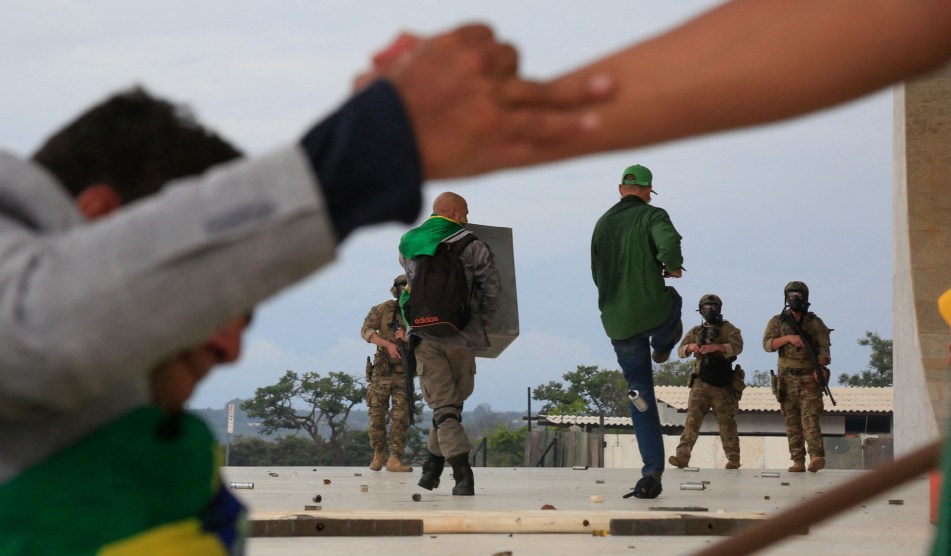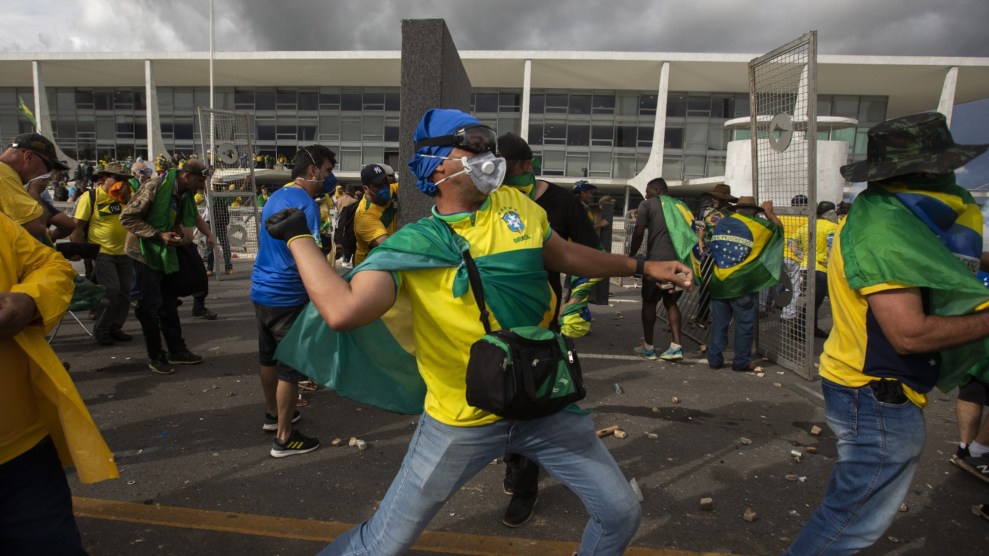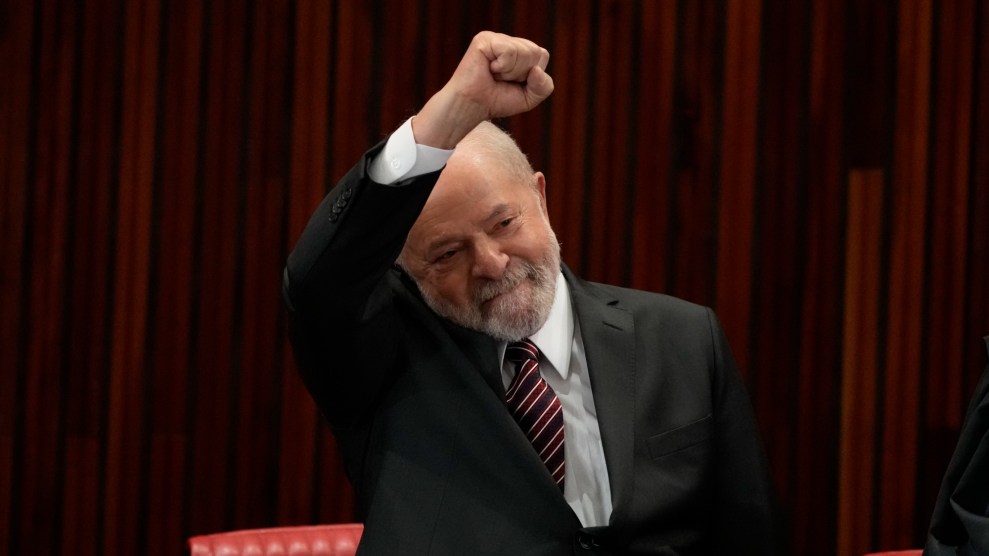
Supporters of Brazilian former President Jair Bolsonaro invade Planalto Presidential Palace while clashing with security forces in Brasilia on January 8, 2023.Sergio Lima/Getty
On January 8, 2023, a week after Brazil’s former president (turned president again) Luiz Inácio Lula da Silva took office following the closest presidential election since the end of the country’s over 20-year military dictatorship—begun in 1964 by a coup partially supported by the United States—a mob of supporters of defeated far-right President Jair Bolsonaro stormed, and vandalized, the center of the nation’s main constitutional powers.
At the time, Bolsonaro was in Orlando, Florida. He was not present as those loyal to his cause descended upon the capital’s Three Powers square ready to ransack the buildings of Congress, presidential offices, and the Supreme Court in an open assault on Brazil’s 40-year-old democracy. Dressed in the yellow, green, and blue shades of the national flag—an embattled symbol that had, over the previous four years, come to signify regression for some and pride for others—the insurrectionists shouted “God, nation, family and, freedom.”
Some called for military intervention. They hoped members of the armed forces aligned with Bolsonaro, an avowed apologist for the dictatorship, would “restore the order.” If not, rioters were ready to take the matter into their own hands. Here they were to do just that. And not unlike their American counterparts, those who invaded and defaced the public buildings proudly filmed themselves as they attempted a coup against their government, producing indelible evidence of the many crimes committed.
Today, on the first anniversary of January 8, Brazil is attempting to remember. At the time, there were many comparisons to America’s attempted coup. “Brazil Just Had Its January 6,” read the headline of a piece I wrote then. They were inevitable. As media reports would later show, Brazilian and US authorities shared concerns—and intelligence—that a copycat antidemocratic act had been in the making. But the aftermath has been radically different.
One year on, Brazil is remembering its coup as a moment to celebrate its democracy, and what was saved when protesters failed on January 8, instead of as a warning that could it once more happen.
Today, Brasília will host an official event initially titled “Democracy Restored,” but since changed to “Unshaken Democracy” (the title of a book and a 57-minute documentary released by the Supreme Court about January 8). Lula summoned his ministers to attend and president of the Superior Electoral Court Alexandre de Moraes and others are expected to give speeches. There will be a symbolic ceremony to restitute some of the since-restored invaluable works of art and historical documents damaged by the insurrectionists to their rightful places.
Much of this is possible because Bolsonaro, for all the comparison, has not been Trump. He has largely stayed out of the spotlight and has not been as dogged in defense of election lies. As Brazilian Defense Minister José Múcio Monteiro put it recently in an interview, the will for a coup was there, but there was no leader. “The institutions didn’t want the coup,” he said.
It also is a product of compromise. In the immediate wake of the failed coup attempt, disparate political leaderships came together in forceful condemnation of the attacks and in the days after, a show of unity was embodied in the image of Lula walking hand in hand with state governors as they moved down the ramp of the damaged Planalto presidential offices. “We won’t allow democracy to slip out of our hands,” Lula said then. Perhaps because of the nation’s still recent history of a military coup, there was little room for hesitation in understanding and calling what had happened as a failed attempt to throw away the Constitution. Across the country, Brazilians took to the streets in pro-democracy protests calling for the rioters and their instigators to be held accountable.
Still, as with the American experience, the full picture of the violence, destruction, and insurgent intent—and of a close call it was—would not be fully known without further investigation and an ongoing public reckoning. In October 2023, a 1,300-page congressional report released to the public pointed to Bolsonaro as the “intellectual author” of the attacks and called for his indictment—as well as that of 60 others—for crimes including criminal association, violent abolition of the democratic rule of law, and coup d’état. “Brazilian democracy was attacked and masses were manipulated by hate speech,” the final report states, adding that “January 8 is the work of Bolsonarismo.” Included in the evidence was the testimony of a former ally of Bolsonaro to investigators about a supposed coup plot to subvert the election results that the president would have been made privy to.
More than 2,000 people were arrested for their involvement in the attacks, 30 have been since convicted, and some sentenced to as many as 17 years in prison. In a recent interview with the O Glogo newspaper, Supreme Court justice and president of the Superior Electoral Court Alexandre de Moraes, who is the rapporteur of the criminal inquiry into the actions of January 8, said there was a plan in place to publicly hang him on the plaza in Brasília. Moraes and the Supreme Court, two of Bolsonaro’s supporter’s biggest foes, played a critical—albeit controversial—role in shielding the cogs of the institutional machine and ultimately helping guarantee the transfer of power.
It may be too soon to tell whether the coup’s memory will come back to haunt Brazil, or if the Brazilian far-right’s anti-democratic delusions have been put to rest for good. It is often said, somewhat jokingly, that Brazilians suffer from short memory and, with time, tend to overlook even the worst kinds of transgressions or offenses committed against them—including by their leaders. But one year after a dreadful episode in the country’s history, there’s a movement to memorialize what a now-retired Supreme Court justice dubbed the “day of infamy.”












